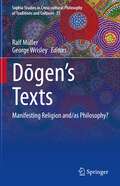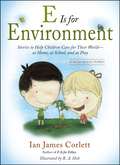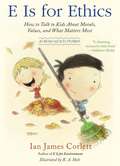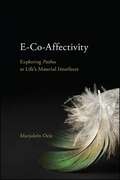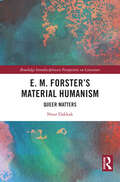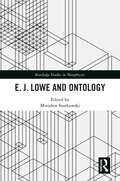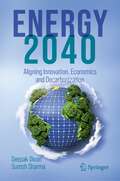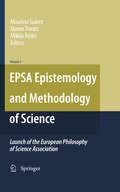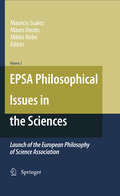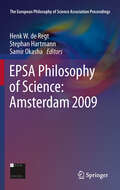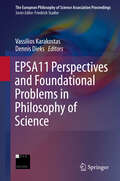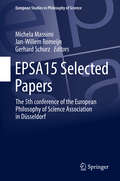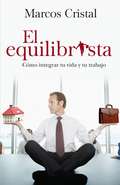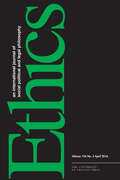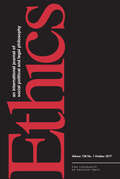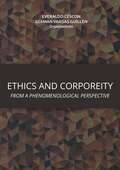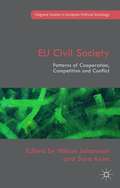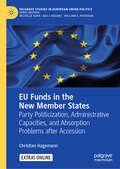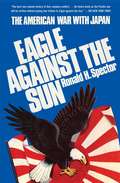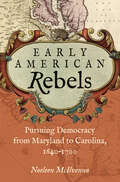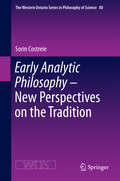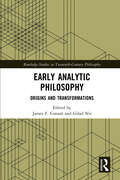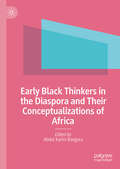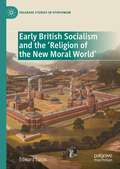- Table View
- List View
Dōgen’s texts: Manifesting Religion and/as Philosophy? (Sophia Studies in Cross-cultural Philosophy of Traditions and Cultures #35)
by Ralf Müller George WrisleyThis book addresses the question of how to properly handle Dōgen’s texts, a core issue that became critical during the Meiji period in which the philosophical appropriation of Dōgen became apparent inside and outside of the monastery. In present day Dōgen studies, most scholarship is informed by a number of factions representing Dōgen. The chapters herein address: the Zennist (j. zenjōka) emphasising practice, the Genzōnians (j. genzōka) shifting the attention to the close reading of Dōgen’s texts, the laity movement opening up both the texts and the practice to people in modern society, and the Genzō researchers (j. genzō kenkyūka) searching for the authenticity and truth of Dōgen’s writings. The book aims to clarify the rightful place of Dōgen: in the monastery, in denominational studies, or in modern academic philosophy? It brings forth various viewpoints on Dōgen, and analyzes the relations of these viewpoints from the premodern to modern times. The collected volume appeals to students and researchers in the field while establishing hermeneutic standards of reading and proposing new, original, and critical interpretations of Dōgen’s texts.Chapter From Uji to Being-time (and Back): Translating Dōgen into Philosophy is available open access under a Creative Commons Attribution 4.0 International License via link.springer.com.
E Is for Environment
by Ian James CorlettFrom the author of E IS FOR ETHICS, 26 stories with eco-friendly messages, accompanied by illustrations, discussion questions, and conservation tips.
E Is for Ethics
by Ian James Corlett R. A. HoltHelping kids think about their earth's future is no easy task. These days, there's a lot of talk about being green, buying organic, and protecting our planet, but making eco-friendly choices can be hard for busy families. Luckily, Ian James Corlett--an award-winning children's TV writer and author of E Is for Ethics--is back with a guide that makes saving the environment a fun family adventure. Best of all, Elliott and Lucy--who made values and morals so accessible in E Is for Ethics--are here to help. In these stories, Elliott and Lucy learn that being good to the environment isn't a big chore--it's actually pretty cool! (And they get to teach Mom and Dad a thing or two along the way.) With this engaging read-together book, families will see that the small things they do every day can make a big impact. Teaching your children about the planet has never been so easy or entertaining--and before you know it, they'll be reminding YOU to recycle!
E-Co-Affectivity: Exploring Pathos at Life’s Material Interfaces (SUNY series in Ancient Greek Philosophy)
by Marjolein OeleE-Co-Affectivity is a philosophical investigation of affectivity in various forms of life: photosynthesis and growth in plants, touch and trauma in bird feathers, the ontogenesis of human life through the placenta, the bare interface of human skin, and the porous materiality of soil. Combining biology, phenomenology, Ancient Greek thought, new materialisms, environmental philosophy, and affect studies, Marjolein Oele thinks through the concrete, living places that show the receptive, responsive power of living beings to be affected and to affect. She focuses on these localized interfaces to explain how affectivity emerges in places that are always evolving, creative, porous, and fluid. Every interface is material, but is also "more" than its current materiality in cocreating place, time, and being. After extensively describing the effects of the milieu and community within which each example of affectivity takes place, in the final chapter Oele adds a prescriptive, ethical lens that formulates a new epoch beyond the Anthropocene, one that is sensitive to the larger ecological, communal concerns at stake.
E. M. Forster’s Material Humanism: Queer Matters (Routledge Interdisciplinary Perspectives on Literature)
by Nour DakkakThrough attending to the nonhuman, E. M. Forster’s Material Humanism: Queer Matters places Forster’s fiction in conversation with contemporary debates concerned with the intersection of neomaterialism, environmental humanities and queer ecology. The book revisits Forster’s liberal humanism from a materialist perspective by focusing on humans’ embodied activities in artificial and natural environments. By examining the everyday embodied experiences of characters, the book thus brings to the fore insignificant and sometimes overlooked aspects in Forster’s fiction. It also places importance on the texts’ treatment of queer intimacy as an embodied experience that can transcend sexual desire. The book acknowledges nonhuman agency as central to our understanding of queerness in Forster’s texts and studies the representation of formless matters such as dust as a way through which Forster’s ecological concerns arise by linking the fate of oppressed humans with oppressed nonhuman others.
E.J. Lowe and Ontology (Routledge Studies in Metaphysics)
by Mirosław SzatkowskiThis volume collects fifteen original essays on E.J. Lowe’s work on metaphysics and ontology. The essays connect Lowe’s insights with contemporary issues in metaphysics. E.J. Lowe (1950–2014) was one of the most influential analytical philosophers of the twentieth and early twenty-first century. Drawing inspiration from Aristotle's thought, E.J. Lowe treated metaphysics as an autonomous discipline concerned with the fundamental structure of reality. The chapters in this volume reflect on his path-breaking work. They deal with a wide range of metaphysical issues including four-category ontology, the causal and non-causal aspects of agency, categorial fundamentality and non-fundamentality, the existence of relations, property dualism, powers and abilities, personal identity, predication, and topological ontology. Taken together, the chapters reflect the liveliness of contemporary debates in metaphysics and the enduring impact of Lowe’s thought on them. E.J. Lowe and Ontology will be of interest to researchers and advanced students working in metaphysics and philosophy of mind.
ENERGY 2040: Aligning Innovation, Economics and Decarbonization
by Deepak Divan Suresh SharmaAccess to energy is essential for our daily lives, economic growth, environment, and sustainability. However, our use of fossil fuels has contributed to global climate change, which poses a significant threat to society and life on this planet. Yet, it has been challenging to reconcile the perceived conflict between economics and climate change, which has created deep divisions in our society. ENERGY 2040: Aligning Innovation, Economics, and Decarbonization provides a holistic and comprehensive analysis of the ongoing energy transition and its underlying causes. It presents a viable path to meet the energy, economic, and climate goals by weaving together science, technology, economics, policy, entrepreneurship, and geopolitics. The book presents a captivating narrative that brings together a range of topics, including new and disruptive technologies with steep learning rates, the challenges of the future power grid, the democratization of energy, and reducing the timeline from science to impact at scale. It also explores the complex role of scientific research, disruptive deep tech, entrepreneurship, and policy in accelerating this energy transformation. This book is a must-read for anyone interested in understanding the future of energy. Whether you're a scientist, energy-industry practitioner, policymaker, investor, student, or concerned citizen, this book offers critical insights into the complex and evolving world of energy, innovation, decarbonization, and climate change.
EPSA Epistemology and Methodology of Science
by Mauricio Suárez Miklós Rédei Mauro DoratoThese volumes collect a selection of papers presented at the Founding Conference of the European Philosophy of Science Association meeting in Madrid. The volumes provide an excellent overview of the state of the art in philosophy of science as practised nowadays in different European countries.
EPSA Philosophical Issues in the Sciences
by Mauricio Suárez Miklós Rédei Mauro DoratoThese volumes collect a selection of papers presented at the Founding Conference of the European Philosophy of Science Association meeting in Madrid. The volumes provide an excellent overview of the state of the art in philosophy of science as practised nowadays in different European countries.
EPSA Philosophy of Science: Amsterdam 2009
by Samir Okasha Henk W. de Regt Stephan HartmannThis is a collection of high-quality research papers in the philosophy of science, deriving from papers presented at the second meeting of the European Philosophy of Science Association in Amsterdam, October 2009.
EPSA11 Perspectives and Foundational Problems in Philosophy of Science
by Dennis Dieks Vassilios KarakostasThis book contains a selection of original conference papers covering all major fields in the philosophy of science, that have been organized into themes. The first section of this volume begins with the formal philosophy of science, moves on to idealization, representation and explanation and then finishes with realism, anti-realism and special science laws. The second section covers the philosophy of the physical sciences, looking at quantum mechanics, spontaneous symmetry breaking, the philosophy of space and time, linking physics and metaphysics and the philosophy of chemistry. Further themed sections cover the philosophies of the life sciences, the cognitive sciences and the social sciences. Readers will find that this volume provides an excellent overview of the state of the art in the philosophy of science, as practiced in different European countries.
EPSA15 Selected Papers
by Gerhard Schurz Michela Massimi Jan-Willem RomeijnThis edited collection showcases some of the best recent research in the philosophy of science. It comprises of thematically arranged papers presented at the 5th conference of the European Philosophy of Science Association (EPSA15), covering a broad variety of topics within general philosophy of science, and philosophical issues pertaining to specific sciences. The collection will appeal to researchers with an interest in the philosophical underpinnings of their own discipline, and to philosophers who wish to study the latest work on the themes discussed.
EQUILIBRISTA, EL (EBOOK)
by Marcos CristalNo es noticia que entre las organizaciones y las personas surjan conflictos y tensiones. La noticia es cómo puedan resolverse. Cuál es el lugar que le damos a nuestra felicidad? Es posible encontrarla en nuestro trabajo? Qué costo pagamos por haber dejado de buscarla? Es responsabilidad también de las empresas? Cuál es la pérdida económica que sufren las organizaciones por no ocuparse de la felicidad de su gente? Es el éxito el camino hacia la felicidad? Soy yo el que maneja las riendas de mi vida? Soy yo un equilibrista? Si te resultan familiares algunas de estas preguntas, sin duda, este libro es para ti. Marcos Cristal nos invita a un viaje exploratorio, de la mano de la filosofía. Mezcla de novela y ensayo, logra un texto revelador a través de situaciones cotidianas de personajes con los que te identificarás rápidamente, nos hace reflexionar sobre las preguntas más esenciales de la vida, sin detenerse en interrogantes y formulando recomendaciones concretas y fecundas para que busques el camino personal que te permita despertar un enamoramiento por lo que haces, y adueñarte del proyecto en el que participas. Un libro fundamental que cambiará tu forma de ver la vida y tu trabajo, que te impulsará a una transformación radical. Esta obra es un buen candidato a ser, a la vez, un buen compañero de ruta, un libro de cabecera y un manual de consulta permanente.
ET vol 126 num 3
by The University of Chicago PressThis is volume 126 issue 3 of Ethics. Ethics features scholarly work that covers a range of topics pertaining to moral, political, and legal philosophy from a variety of intellectual perspectives, including social and political theory, law, and economics. Articles in the journal present new theories, apply theory to contemporary moral issues, and focus on historical works that have significant implications for contemporary theory. In addition to major articles, Ethics publishes critical discussions, symposia, review essays, and book reviews.
ET vol 128 num 1
by The University of Chicago PressThis is volume 128 issue 1 of Ethics. Ethics features scholarly work that covers a range of topics pertaining to moral, political, and legal philosophy from a variety of intellectual perspectives, including social and political theory, law, and economics. Articles in the journal present new theories, apply theory to contemporary moral issues, and focus on historical works that have significant implications for contemporary theory. In addition to major articles, Ethics publishes critical discussions, symposia, review essays, and book reviews.
ETHICAL DECISION MAKING FOR THE 21ST CENTURY
by Frank G. ForrestThis book is about ethical decision of the 21st Century
ETHICS AND CORPOREITY FROM A PHENOMENOLOGICAL PERSPECTIVE
by Everaldo Cescon Germán Vargas GuillénThe approach to the theme of the body within the framework of phenomenology is developed in 20th century France. Despite the evident Cartesianism, it is there that the principles of a phenomenology of the body are configured, in the confluence between the phenomenological tradition and the philosophy of existence. The systematic development of the phenomenology of the body, which takes centered reflection on the corporeal existence and the incarnated subject, corresponds, among others, to Gabriel Marcel, Jean-Paul Sartre, Maurice Merleau-Ponty and Bernhard Waldenfels. The phenomenology of the body opens a new horizon to understand the corporeal dimension of human existence and offers a new philosophical view of the body, while the body is not only an observable reality as an object, but it is a dimension of the being itself, as, according to Merleau-Ponty, from the phenomenology of “corporeal existence”, the body is the “medium” of our “being-in-the-world”. That is precisely why it can be radically said that “being-in-the-world” (Heidegger) is primarily a “corporal-being-in-the-world" (Waldenfels). This implies “belonging to the world”, being “implicated” in the world through the body and, also, that the body opens a subject to the world. The phenomenology of the body sought to restore the unity of human existence. Husserl, Scheler, Marcel, Merleau-Ponty, Sartre, Waldenfels, among others, break with the modern mechanistic conception of the body and resignify subjectivity and objectivity, in open opposition to the dualistic tradition. The phenomenology of corporeal existence makes the body our way-to-be-in-the-world. The body not only ceases to be an object, but also a passive structure, receiving a reality configured by the confines of res cogitans. Based on Husserl, a theory of the phenomenological body is developed, which will reverse the subordinate role that the body had in Cartesian thought. Merleau-Ponty, who t
EU Civil Society: Patterns Of Cooperation, Competition And Conflict (Palgrave Studies in European Political Sociology)
by Sara Kalm H�kan JohanssonThis volume provides a novel and relational sociological approach to the study of EU civil society. It focuses on the interactions and interrelations between civil society actors and the forms of capital that structure the fields and sub-fields of EU civil society, through new and important empirical studies on organized EU civil society.
EU Funds in the New Member States: Party Politicization, Administrative Capacities, And Absorption Problems After Accession (Palgrave Studies in European Union Politics)
by Christian HagemannThis book examines new member states’ problems with the absorption of EU funds. Since accession, many new member states from Central and Eastern Europe struggle to access their billions of development funds from Brussels. While existing research mostly emphasizes the role of states’ administrative capacities to account for absorption problems, this study adds the so far neglected role of politics as party politicization to the equation. The argument is tested using a combination of fuzzy-set Qualitative Comparative Analysis (fsQCA) with two detailed process tracing case studies. This book will appeal to scholars interested in EU cohesion policy, post-accession compliance, and post-communist politics.
Eagle Against the Sun: The American War with Japan
by Ronald H. SpectorHistorian Ronald H. Spector, drawing on declassified intelligence files, an abundance of British and American archival material, Japanese scholarship and documents, and the research and memoirs of scholars, politicians, and the military men, presents a thrilling narrative of American war in the Pacific. Spector reassesses U.S. and Japanese strategy and offers some provocative interpretations. He shows that the dual advance across the Pacific by MacArthur and Nimitz was less a product of strategic calculation and more a pragmatic solution to bureaucratic, doctrinal, and public relations problems facing the Army and Navy. He also argues that Japan made its fatal error not in the Midway campaign but in abandoning its offensive strategy after that defeat and allowing itself to be drawn into a war of attrition. Combining impeccable research with electrifying detail, Spector vividly recreates the major battles, little-known campaigns, and unfamiliar events of this brutal 44-month struggle. He reveals that the U.S. had secret plans to wage unrestricted submarine warfare against Japan months before Pearl Harbor and demonstrates that MacArthur and his commanders ignored important intercepts of Japanese messages that would have saved thousands of lives in Papua and Leyte. He skillfully takes the reader from top-secret strategy meetings in Washington, London, and Tokyo to distant beaches and remote Asian jungles with battle-weary GIs. Throughout, Spector contends that American decisions in the Pacific War were shaped more often by the struggles between the British and the Americans, and between the Army and the Navy, than by strategic considerations. Revealing what really happened in the course of a conflict that ended with the most deadly air raid ever, this contribution to WWII history adds a new dimension to our understanding of the people and forces that determined its outcome.ir raid ever, this magisterial contribution to WWII history adds a new dimension to our understanding of the people and forces that determined its outcome.
Early American Rebels: Pursuing Democracy from Maryland to Carolina, 1640–1700
by Noeleen McIlvennaDuring the half century after 1650 that saw the gradual imposition of a slave society in England's North American colonies, poor white settlers in the Chesapeake sought a republic of equals. Demanding a say in their own destinies, rebels moved around the region looking for a place to build a democratic political system. This book crosses colonial boundaries to show how Ingle's Rebellion, Fendall's Rebellion, Bacon's Rebellion, Culpeper's Rebellion, Parson Waugh's Tumult, and the colonial Glorious Revolution were episodes in a single struggle because they were organized by one connected group of people. Adding land records and genealogical research to traditional sources, Noeleen McIlvenna challenges standard narratives that disdain poor whites or leave them out of the history of the colonial South. She makes the case that the women of these families played significant roles in every attempt to establish a more representative political system before 1700. McIlvenna integrates landless immigrants and small farmers into the history of the Chesapeake region and argues that these rebellious anti-authoritarians should be included in the pantheon of the nation's Founders.
Early Analytic Philosophy - New Perspectives on the Tradition
by Sorin CostreieThis volume discusses some crucial ideas of the founders of the analytic philosophy: Gottlob Frege, Bertrand Russell and Ludwig Wittgenstein, or the 'golden trio'. The book shows how these 'old' ideas are still present and influential in the current philosophical debates and to what extent these debates echo the original ideas. The collection aim is twofold: to better understand these fruitful ideas by placing them in the original setting, and to systematically examine these ideas in the context of the current debates animating philosophical discussions today. Divided into five sections, the book first sets the stage and offers a general introduction to the background influences, as well as delimitations of the initial foundational positions. This first section contains two papers dedicated to the discussion of realism and the status of science at that time, followed by two papers that tackle the epistemic status of logical laws. The next three sections constitute the core of the volume, each being dedicated to the most important figures in the early analytic tradition: Frege, Russell, and Wittgenstein. The last section gathers several essays that discuss either the relation between two or more analytic thinkers, or various important concepts such as 'predicativism' and 'arbitrary function', or the principles of abstraction and non-contradiction.
Early Analytic Philosophy: Origins and Transformations (Routledge Studies in Twentieth-Century Philosophy)
by James F. Conant Gilad NirThe past few decades have seen considerable interest in the history of analytic philosophy. As this field has developed, complex and provocative questions have emerged about the very nature of analytic philosophy, challenging longstanding assumptions and spawning new research paradigms.In this outstanding collection, an international team of contributors examine these questions and contribute to these debates, exploring the idea of analysis, the essence and status of logic, the nature of the proposition and its linguistic expression, the logical act of judgment, the distinction between external and internal relations, the possibility of category mistakes, and the demarcation of sense from nonsense. Several of the chapters shed light on the interconnections between Wittgenstein and other figures within that tradition, including Frege, Russell, Ramsey, and Ryle. Other chapters examine the interaction between analytic philosophers and members of other philosophical traditions, including Frege and Weierstrass, Wittgenstein and Schopenhauer, Wittgenstein and Bradley, Russell and the North American Pragmatists, Russell and the Neo-Kantians, Wittgenstein and Heidegger, and Heidegger and Ryle. Among the specific topics explored are Russell’s conception of the judging subject, Wittgenstein’s discussion of rule-following, Frege’s conception of the logical categories, and Wittgenstein’s conception of nonsense.The volume also includes a book review by Gilbert Ryle – collected and published non-anonymously here for the first time – which sheds important light on the reception of Frege’s philosophy in the analytic tradition.Early Analytic Philosophy: Origins and Transformations will be of great interest to those studying and researching the history of twentieth-century philosophy, contemporary analytic philosophy, and the philosophy of language and logic.
Early Black Thinkers in the Diaspora and Their Conceptualizations of Africa
by Abdul Karim BanguraThis book argues that just as the ideas of Pan-Africanism birthed by Henry Sylvester-Williams and others in the late 1800s and Negritude ushered by Aimé Césaire and others in the early 1900s emboldened many major Black thinkers to push for independence across Africa, so will these early thinkers’ ideas help in the building of a new Africa. The various chapters explore the proposition that the thoughts of early great Diaspora Black thinkers are still wellsprings of tenets that can be used to build a new Africa. The chapters examine how these thinkers conceptualized Africa in their works, with the main objective of delineating their conceptualizations to generate suggestions on how to build a new Africa.
Early British Socialism and the ‘Religion of the New Moral World’ (Palgrave Studies in Utopianism)
by Edward LucasThis book challenges existing accounts of the role of religion in early-nineteenth-century British socialism. Against scholarly interpretations which have identified Owenite socialists as anti-religious or as imitating Christianity, this book argues that Owenites offer a re-conception of the nature of ‘religion’ as advanced through knowledge of the natural and social world, as a prospective source of solidarity which could serve as the unifying bond for communities, and as constituted by ethical conduct. It shows how this re-conception was formed through a sincere and considered reflection upon the problem of religious truth and was shaped by the particular religious context of early-nineteenth-century Britain. It then demonstrates the importance of this reimagination of religion to their understanding of socialism. Their religious interests were not an eccentric adornment to their socialism, an outdated residue yet to be shed and encumbering the development of a mature socialism, or merely instrumental to their temporal goals. Instead, Owenite ambitions of religious reform were grounded in the philosophical preoccupations which animated their socialism.
